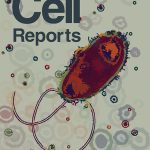 McMillan graphical abstract featured on the cover with Cell Reports.Plant-microbe interactions 101 just added a new chapter! Learn about how outer membrane vesicles from pathogenic and commensal plant bacteria activate protective plant immune responses in the latest publication from the Kuehn lab. Vesicles may be small, but these complex biological packages play a big role in inter-kingdom interactions, suggesting a promising role as tools to probe plant immune responses. Read the full story here and be sure to check out the cover of the issue!
McMillan graphical abstract featured on the cover with Cell Reports.Plant-microbe interactions 101 just added a new chapter! Learn about how outer membrane vesicles from pathogenic and commensal plant bacteria activate protective plant immune responses in the latest publication from the Kuehn lab. Vesicles may be small, but these complex biological packages play a big role in inter-kingdom interactions, suggesting a promising role as tools to probe plant immune responses. Read the full story here and be sure to check out the cover of the issue!
Congratulations to the Heaton Lab. Congrats to the Heaton lab who published a new study describing how fetal inflammation can be controlled during a maternal viral infection. To read the paper that was published in Science please click here.
 Catching up with Deborah Springer. Deb Springer, former fellow in the Heitman Lab, has been spending her lab time on the fight against COVID19. Now with a Ph.D. in biomedical sciences, immunology, and infectious diseases from the University at Albany, she works as a lead science in assay development, translational genomics, for Q2 Solutions in North Carolina. Her hours in the lab these days ultimately help advance COVID-19 research. To read more on Springer’s journey please click here.
Catching up with Deborah Springer. Deb Springer, former fellow in the Heitman Lab, has been spending her lab time on the fight against COVID19. Now with a Ph.D. in biomedical sciences, immunology, and infectious diseases from the University at Albany, she works as a lead science in assay development, translational genomics, for Q2 Solutions in North Carolina. Her hours in the lab these days ultimately help advance COVID-19 research. To read more on Springer’s journey please click here.
 Kristin Thole earns certification from the national board for health and wellness coaching (NBHWC). OBGE congratulates Kristin Thole, OBGE Health & Wellness Coach, on earning national certification from the National Board for Health and Wellness Coaching (NBHWC). Kristin, who provides Health & Wellness Coaching to PhD students in the School of Medicine, received her training with the Duke Integrative Health Coach Professional Training Program.
Kristin Thole earns certification from the national board for health and wellness coaching (NBHWC). OBGE congratulates Kristin Thole, OBGE Health & Wellness Coach, on earning national certification from the National Board for Health and Wellness Coaching (NBHWC). Kristin, who provides Health & Wellness Coaching to PhD students in the School of Medicine, received her training with the Duke Integrative Health Coach Professional Training Program.
Health & Wellness Coaching is not just about one’s physical well-being, it is about the whole person: their values, goals, work, balance, fulfillment, and life purpose. Any concern that gets in the way of achieving optimal health and well-being is the perfect subject for beginning coaching (for example: stress, exercise, rest, communication, relationships, physical space, professional development). Health and wellness coaching effectively motivates and supports behavior change through a structured partnership between the client and coach. The coach helps the individual develop and realize their optimal health vision through inquiry, personal discovery, and accountability. Health & Wellness Coaching is not professional counseling or psychotherapy.
Expected outcomes of a coaching session include:
- Clear understanding of your goals and values
- Motivation to support behavior change
- Strategies for moving toward your goals

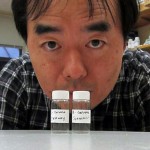
Heaton and Matsunami among a team of researchers studying the mysterious symptom of abrupt loss of smell and taste associated with COVID-19. The researchers are located in the Departments of Neurobiology, Molecular Genetics and Microbiology, Immunology, and Head and Neck Surgery and Communication Sciences. I’ve also attached the original image and an image that can be used with social media. Thanks in advance for sharing this story on your blogs, websites, and social media.
 Gokhale awarded Helen Hay Whitney Award. Congratulations to Nandan Gokhale, former student in Stacy Horner’s lab, now postdoctoral Fellow in Ram Savan’s lab at the University of Washington, on being awarded the Helen Hay Whitney Fellowship Award. The Helen Hay Whitney Foundation was established and endowed by Mrs. Charles S. Payson, the former Joan Whitney, in 1947, and named in honor of her mother, Helen Hay Whitney. Originally established to stimulate and support research in the area of rheumatic fever and rheumatic heart disease, the Foundation later expanded its interests to include diseases of connective tissue and, ultimately, all basic biomedical sciences. The Helen Hay Whitney Foundation supports early postdoctoral research training in all basic biomedical sciences. The most critical and long-lasting investment in the research enterprise is the development of career scientists who contribute through both their own research and, eventually, their training of future generations of scientists. Whitney Fellows have gone on to become some of the most highly regarded medical and scientific professionals in their respective fields, and have served as mentors to succeeding generations of scientists.
Gokhale awarded Helen Hay Whitney Award. Congratulations to Nandan Gokhale, former student in Stacy Horner’s lab, now postdoctoral Fellow in Ram Savan’s lab at the University of Washington, on being awarded the Helen Hay Whitney Fellowship Award. The Helen Hay Whitney Foundation was established and endowed by Mrs. Charles S. Payson, the former Joan Whitney, in 1947, and named in honor of her mother, Helen Hay Whitney. Originally established to stimulate and support research in the area of rheumatic fever and rheumatic heart disease, the Foundation later expanded its interests to include diseases of connective tissue and, ultimately, all basic biomedical sciences. The Helen Hay Whitney Foundation supports early postdoctoral research training in all basic biomedical sciences. The most critical and long-lasting investment in the research enterprise is the development of career scientists who contribute through both their own research and, eventually, their training of future generations of scientists. Whitney Fellows have gone on to become some of the most highly regarded medical and scientific professionals in their respective fields, and have served as mentors to succeeding generations of scientists.
 Gibbs recipient of the 2020 Chancellor’s Award for Research Excellence. Kyle Gibbs, Denis Ko Lab, has been selected as a recipient of the 2020 Chancellor’s Award, for Research Excellence(CARE). This award acknowledges dedication and exceptional contributions as a graduate student, including scientific discoveries and publications, as well as the positive impact you have had on lab, departmental, and institutional culture.
Gibbs recipient of the 2020 Chancellor’s Award for Research Excellence. Kyle Gibbs, Denis Ko Lab, has been selected as a recipient of the 2020 Chancellor’s Award, for Research Excellence(CARE). This award acknowledges dedication and exceptional contributions as a graduate student, including scientific discoveries and publications, as well as the positive impact you have had on lab, departmental, and institutional culture.
In the Ko Lab, Kyle studies how multiple host and pathogen factors regulate Salmonella replication inside human cells. To date, his main discovery is that a Salmonella protein, SarA, is translocated into host cells where it mimicks the cytokine co-receptor gp130 to activate STAT3 signaling. This effector-induced reprogramming of host transcription promotes Salmonella replication in cells, as well as virulence in mice. Concurrently, he has discovered intracellular replication of Salmonella is also regulated by human genetic variation affecting expression levels of a divalent cation channel. Thus, his work demonstrates novel mechanisms by which pathogen and host diversity generate divergent outcomes during Salmonella infection.
 Transcription factors may inadvertently lock in DNA mistakes. Raluca Gordan, MGM Secondary Faculty Member, led a team of Duke Researchers to find that transcription factors have a tendency to bind strongly to “mismatched” sections of DNA, sections of the code that were not copied correctly. The strong binding of transcription factors to mismatched sections of regulatory DNA might be a way in which random mutations become a problem that leads to disease, including cancer. To read more, click here.
Transcription factors may inadvertently lock in DNA mistakes. Raluca Gordan, MGM Secondary Faculty Member, led a team of Duke Researchers to find that transcription factors have a tendency to bind strongly to “mismatched” sections of DNA, sections of the code that were not copied correctly. The strong binding of transcription factors to mismatched sections of regulatory DNA might be a way in which random mutations become a problem that leads to disease, including cancer. To read more, click here.
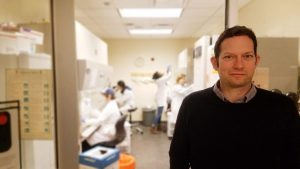
DCI Virologist Pursues EBV Pathways To Cancer. Micah Luftig was elected for his work on the Epstein-Barr virus (EBV) and the temporal regulation of gene expression in viral-induced cancers. Luftig is interested in viral pathogenesis and immune response and how that differs between patients that do and do not go on to develop cancer. To read more, click here.
 Heaton, Scent-Sensing Cells Have a Better Way to Fight Flu. A collaboration between Heaton’s team and the laboratory of Ashley Moseman in Duke immunology reports on the remarkably robust immune response of olfactory sensory neurons, the smell receptors that line the nose, where a virus might first be encountered. Their finding reveals not only a successful strategy against infection, it points out the diversity of immune responses from one kind of cell to another, Heaton said. To read more, click here.
Heaton, Scent-Sensing Cells Have a Better Way to Fight Flu. A collaboration between Heaton’s team and the laboratory of Ashley Moseman in Duke immunology reports on the remarkably robust immune response of olfactory sensory neurons, the smell receptors that line the nose, where a virus might first be encountered. Their finding reveals not only a successful strategy against infection, it points out the diversity of immune responses from one kind of cell to another, Heaton said. To read more, click here.
 Fowler to give lecture on IDWeek. Vance Fowler MGM Secondary Faculty Member will be featured on IDWeek October 23, 2020. IDWeek will feature Vance G. Fowler, Jr., MD, MHS in the Maxwell Finland Lecture on Friday, Oct. 23 at 5:30 p.m. ET. “Staphylococcus aureus: Lessons Learned from 20 Years with the Persistent Pathogen.” Listen to an expert on Staphylococcus aureus describe the impact that a project can have on improved patient outcomes as well as summarize the importance of clinical, bacterial, and host genetic factors in influencing the initiation and severity of infections caused by S. aureus.
Fowler to give lecture on IDWeek. Vance Fowler MGM Secondary Faculty Member will be featured on IDWeek October 23, 2020. IDWeek will feature Vance G. Fowler, Jr., MD, MHS in the Maxwell Finland Lecture on Friday, Oct. 23 at 5:30 p.m. ET. “Staphylococcus aureus: Lessons Learned from 20 Years with the Persistent Pathogen.” Listen to an expert on Staphylococcus aureus describe the impact that a project can have on improved patient outcomes as well as summarize the importance of clinical, bacterial, and host genetic factors in influencing the initiation and severity of infections caused by S. aureus.
 Congratulations to Matt Scaglione on being awarded the 2020 Dictyostelium Junior Faculty Award. Research in the Scaglione laboratory focuses on understanding how these pathways play a protective role in neurodegenerative diseases. Our lab is particularly interested in how protein homeostasis (proteostasis) is maintained in the cellular slime mold Dictyostelium discoideum. Our interest in Dictyostelium discoideum comes from its peculiar genome that encodes for nearly 10,000 proteins that contain homopolymeric amino acid tracts. Among the most common repeats are polyglutamine tracts. This is particularly surprising because expanded polyglutamine repeats cause a class of nine neurodegenerative diseases in humans. We and others have found that unlike other organisms Dictyostelium discoideum is naturally resistant to polyglutamine aggregation. Further work from our group has identified a novel type of molecular chaperone that suppresses polyglutamine aggregation in Dictyostelium discoideumand in human cells. Future work in the Scaglione lab is to both identify other novel factors that prevent protein aggregation in Dictyostelium discoideum and to determine if these factors can be utilized to treat neurodegenerative diseases in humans.
Congratulations to Matt Scaglione on being awarded the 2020 Dictyostelium Junior Faculty Award. Research in the Scaglione laboratory focuses on understanding how these pathways play a protective role in neurodegenerative diseases. Our lab is particularly interested in how protein homeostasis (proteostasis) is maintained in the cellular slime mold Dictyostelium discoideum. Our interest in Dictyostelium discoideum comes from its peculiar genome that encodes for nearly 10,000 proteins that contain homopolymeric amino acid tracts. Among the most common repeats are polyglutamine tracts. This is particularly surprising because expanded polyglutamine repeats cause a class of nine neurodegenerative diseases in humans. We and others have found that unlike other organisms Dictyostelium discoideum is naturally resistant to polyglutamine aggregation. Further work from our group has identified a novel type of molecular chaperone that suppresses polyglutamine aggregation in Dictyostelium discoideumand in human cells. Future work in the Scaglione lab is to both identify other novel factors that prevent protein aggregation in Dictyostelium discoideum and to determine if these factors can be utilized to treat neurodegenerative diseases in humans.


Two pairs of Duke SOM PhD trainees and their PIs which includes from MGM, Briana Davis and John Rawls, have been awarded the HHMI Gilliam Fellowship for Advanced study this year. The official new release came out a few hours ago from HHMI. This is a very prestigious award as there is an internal competitive process to be nominated and only 45 fellowships were awarded across the country.
Brief description of award:
The goal of the Gilliam Fellowships for Advanced Study is to increase the diversity among scientists who are prepared to assume leadership roles in science, particularly as college and university faculty. The program provides awards to pairs of students and their dissertation advisers who are selected for their scientific leadership and commitment to advance diversity and inclusion in the sciences.
The link to the official announcement can be found here:
https://www.eurekalert.org/pub_releases/2020-07/hhmi-ha4073120.php
The full list of awardees can be found here- https://www.eurekalert.org/pub_releases/2020-07/hhmi-ha4073120.php#fellows-table
From Duke (name, department/program, PI):
– Briana Davis, MGM, John Rawls lab
– Nina Marie Garcia, Pharmacology, James Alvarez
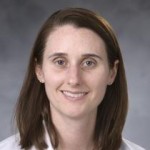 Permar awarded Gale and Ira Drukier prize in Children’s Health Research. Congratulations Sallie Permar, Professor of Pediatrics, on being awarded the fifth annual Gale and Ira Drukier Prize in Children’s Health Research. The Drukier Prize honors early-career pediatricians whose research has made important contributions toward improving the health of children and adolescents. Dr. Permar, associate dean of physician scientist development, professor of pediatrics, immunology, molecular genetics and microbiology, and founding director of the Children’s Health and Discovery Institute at Duke University School of Medicine, is being honored for her research into the development of vaccines to prevent mother-to-child transmission of neonatal viral pathogens.
Permar awarded Gale and Ira Drukier prize in Children’s Health Research. Congratulations Sallie Permar, Professor of Pediatrics, on being awarded the fifth annual Gale and Ira Drukier Prize in Children’s Health Research. The Drukier Prize honors early-career pediatricians whose research has made important contributions toward improving the health of children and adolescents. Dr. Permar, associate dean of physician scientist development, professor of pediatrics, immunology, molecular genetics and microbiology, and founding director of the Children’s Health and Discovery Institute at Duke University School of Medicine, is being honored for her research into the development of vaccines to prevent mother-to-child transmission of neonatal viral pathogens.
To read more click here.
 Sullivan part of international team of researchers that generated a complete human X chromosome sequence. In an accomplishment that opens a new era in genomic research, Beth Sullivan and her lab have joined with the Telomere-to-Telomere (T2T) consortium, including researchers at the National Human Genome Research Institute (NHGRI), University of Washington, and University of California, Santa Cruz, to produce the first end-to-end DNA sequence of a human chromosome. The results, published on July 14th in the journal Nature, show that generating a precise, base-by-base sequence of a human chromosome is now possible, and will enable researchers to produce a complete sequence of the human genome.
Sullivan part of international team of researchers that generated a complete human X chromosome sequence. In an accomplishment that opens a new era in genomic research, Beth Sullivan and her lab have joined with the Telomere-to-Telomere (T2T) consortium, including researchers at the National Human Genome Research Institute (NHGRI), University of Washington, and University of California, Santa Cruz, to produce the first end-to-end DNA sequence of a human chromosome. The results, published on July 14th in the journal Nature, show that generating a precise, base-by-base sequence of a human chromosome is now possible, and will enable researchers to produce a complete sequence of the human genome.
After nearly two decades of improvements, the reference sequence of the human genome represents the most accurate and complete vertebrate genome sequence ever produced. Still, there are hundreds of gaps or missing DNA sequences that are unknown. These gaps most often contain repetitive DNA segments that are exceptionally difficult to sequence, and are likely to include genes and other functional elements that may be relevant to human health and disease.
In this study, researchers sequenced the X chromosome using Oxford Nanopore and PacBio technologies that can sequence long segments of DNA. The research teams used newly developed computer programs to assemble the many segments of generated ultra-long read sequence. A notable aspect of this effort was closing of the largest remaining sequence gap on the X chromosome, the roughly 3 million bases of repetitive DNA found at the middle portion of the chromosome, called the centromere that is responsible for chromosome inheritance and genome stability. There is no “gold standard” for researchers to critically evaluate the accuracy of assembling such highly repetitive DNA sequences, and the Sullivan Lab was called on to help confirm the validity of the generated sequence using the molecular approach of pulsed field gel electrophoresis and Southern blotting.
Sullivan’s co-authors include senior author Adam Phillippy at the National Human Genome Research Institute (NHGRI), Jennifer Gerton, a Senior Investigator at the Stowers Institute for Medical Research and former trainee of MGM faculty member Tom Petes, and first author Karen Miga, a graduate of Duke’s University Program in Genetics and Genomics.
The T2T consortium, partially funded by NHGRI, aims to generate a more complete reference sequence of the human genome and is continuing its efforts with the remaining human chromosomes to generate a complete human genome sequence in 2020.
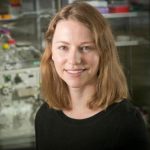 Derbyshire, Fighting Malaria in the Classroom and in the Lab. Trinity College of Arts and Sciences recently published an article on Emily Derbyshire, Assistant Professor of Chemistry and Secondary MGM Faculty Member, focusing on how she wants to help people – and she wants to do it at scale. Derbyshire’s focus in the classroom is overcoming the fear chemistry inspires in many students. Derbyshire quotes, “I try to remove any intimidation or preconceived notions about how hard it is. I think sometimes people just never had the opportunity to be taught in a way that was accessible.” To read the full article please click here.
Derbyshire, Fighting Malaria in the Classroom and in the Lab. Trinity College of Arts and Sciences recently published an article on Emily Derbyshire, Assistant Professor of Chemistry and Secondary MGM Faculty Member, focusing on how she wants to help people – and she wants to do it at scale. Derbyshire’s focus in the classroom is overcoming the fear chemistry inspires in many students. Derbyshire quotes, “I try to remove any intimidation or preconceived notions about how hard it is. I think sometimes people just never had the opportunity to be taught in a way that was accessible.” To read the full article please click here.
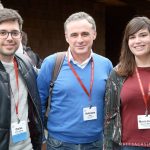 Congratulations to Dr. Victor Garre, Professor of Genetics at the University of Murcia and his two Ph.D. students, Maribel Navarro Mendoza and Carlos Perez Arques, for receiving the Fleming Award for a recent article published in Current Biology on discovering the centormeres of Mucor. The Fleming Award is granted by the Spanish Society of Microbiology (SEM). With the receipt of the award, one of the authors is invited to give the closing plenary talk at the upcoming XV National Conference on Mycology. This meeting is being postponed until 2022 because of the COVID-19 crisis. Click here to read the paper. This paper was a collaboration between several investigators including Dr. Joseph Heitman and Dr. Kaustuv Sanyal.
Congratulations to Dr. Victor Garre, Professor of Genetics at the University of Murcia and his two Ph.D. students, Maribel Navarro Mendoza and Carlos Perez Arques, for receiving the Fleming Award for a recent article published in Current Biology on discovering the centormeres of Mucor. The Fleming Award is granted by the Spanish Society of Microbiology (SEM). With the receipt of the award, one of the authors is invited to give the closing plenary talk at the upcoming XV National Conference on Mycology. This meeting is being postponed until 2022 because of the COVID-19 crisis. Click here to read the paper. This paper was a collaboration between several investigators including Dr. Joseph Heitman and Dr. Kaustuv Sanyal.
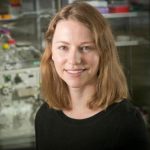 Derbyshire: 2020 Camille Dreyfus Teacher-Scholar. Congratulations to Emily Derbyshire, Assistant Professor of Chemistry and secondary MGM faculty member, on being awarded a 2020 Camille Dreyfus Teacher-Scholar Award. The Camille Dreyfus Teacher-Scholar Awards Program supports the research and teaching careers of talented young faculty in the chemical sciences. Based on institutional nominations, the program provides discretionary funding to faculty at an early stage in their careers. Criteria for selection include an independent body of scholarship attained in the early years of their appointment, and a demonstrated commitment to education, signaling the promise of continuing outstanding contributions to both research and teaching.
Derbyshire: 2020 Camille Dreyfus Teacher-Scholar. Congratulations to Emily Derbyshire, Assistant Professor of Chemistry and secondary MGM faculty member, on being awarded a 2020 Camille Dreyfus Teacher-Scholar Award. The Camille Dreyfus Teacher-Scholar Awards Program supports the research and teaching careers of talented young faculty in the chemical sciences. Based on institutional nominations, the program provides discretionary funding to faculty at an early stage in their careers. Criteria for selection include an independent body of scholarship attained in the early years of their appointment, and a demonstrated commitment to education, signaling the promise of continuing outstanding contributions to both research and teaching.
The Derbyshire lab combines chemical biology, biochemistry and genomics to uncover complex biological processes in pathogenic parasites with the long-term goal of advancing therapeutic design. Through an integrative approach utilizing small molecule probes, gene sequencing technologies, proteomics and high-throughput screening, their efforts have discovered parasite and host processes involved in Plasmodium parasite infection. Their findings highlight the dependence of Plasmodium on host factors and reveal parasite vulnerabilities that may be leveraged for future disease control efforts.
 Ko promoted to Associate Professor with tenure. Please join in congratulating Dennis Ko, whose promotion to Associate Professor with tenure was just approved by the Duke Board of Trustees. This is terrific and richly deserved news, and MGM is very fortunate to have Dennis as a colleague. Ko joined the faculty of Duke Molecular Genetics & Microbiology in 2012, his research program is advancing in science and with translational potential to impact medicine as well.
Ko promoted to Associate Professor with tenure. Please join in congratulating Dennis Ko, whose promotion to Associate Professor with tenure was just approved by the Duke Board of Trustees. This is terrific and richly deserved news, and MGM is very fortunate to have Dennis as a colleague. Ko joined the faculty of Duke Molecular Genetics & Microbiology in 2012, his research program is advancing in science and with translational potential to impact medicine as well.
The Ko lab discovers fundamental insights in host-pathogen interactions and susceptibility to infectious disease by using both human and pathogen genetic diversity. Ko pioneered genome-wide association studies of cellular infection traits more than a decade ago with the Hi-HOST platform (High-throughout Human in vitrO Susceptibility Testing). His lab has used Hi-HOST, experimental dissection, and translational studies to make discoveries regarding the role of methylthioadenosine (MTA) in regulation of inflammation and sepsis, human genetic variation and Salmonella invasion and typhoid fever risk, and human genetic regulation of C. trachomatis infection. They have also expanded Hi-HOST to various bacterial, fungal, protozoal and viral pathogens and made data publicly available: http://h2p2.oit.duke.edu. They have also had success in leveraging pathogen variation to discover a Salmonella secreted effector that mimics the cytosolic domain of an activated cytokine receptor to turn on STAT3 and that diverse intracellular pathogens evolved convergent mechanisms of CXCL10 suppression for immune evasion. Ultimately, the Ko lab utilizes a unique perspective to reveal critical genes and pathways with the goal of enabling development of new biomarkers and therapies.
During the COVID-19 pandemic, Dennis is leading his research program while homeschooling his two children while his wife treats patients at Durham Regional Hospital. While at home, he taught his son how to ride a bike, observed 4 planets and 3 of the moons of Jupiter through their backyard telescope, supervised the construction of the Saturn V rocket (in Lego form), invented marshmallow nutter butters, and helped take down their Christmas tree in April. Members of his lab in this time defended a thesis, submitted an F31, remotely taught a college microbiology class, analyzed various omics datasets, worked on manuscripts, and fostered a dog.
 Heitman joins American Academy of Arts & Sciences (AAAS). Please congratulate Joseph Heitman, Chair and James B. Duke Distinguished Professor of Molecular Genetics and Microbiology, on being elected as a member of the American Academy of Arts & Sciences (AAAS) for 2020. He is among 276 artists, scholars, scientists and leaders honored this year.
Heitman joins American Academy of Arts & Sciences (AAAS). Please congratulate Joseph Heitman, Chair and James B. Duke Distinguished Professor of Molecular Genetics and Microbiology, on being elected as a member of the American Academy of Arts & Sciences (AAAS) for 2020. He is among 276 artists, scholars, scientists and leaders honored this year.
Founded in 1780, the American Academy of Arts and Sciences honors excellence and convenes leaders from every field of human endeavor to examine new ideas, address issues of importance to the nation and the world, and work together, as expressed in our charter, “to cultivate every art and science which may tend to advance the interest, honor, dignity, and happiness of a free, independent, and virtuous people.” Our studies have helped set the direction of research and analysis in science and technology policy, global security and international affairs, social policy, education, and the humanities.
Heitman states “It is a humbling honor to be elected to the American Academy of Arts & Sciences, and a testament to being surrounded by highly talented lab members, colleagues, and collaborators who made this success possible. Also especially touching to share this honor with a stellar cadre of Duke colleagues who were also elected to the academy from across the university this year”.
A message from Nancy C. Andrews:
“We congratulate these incoming members of the Academy for excelling in a broad array of fields; we want to celebrate them and learn from them,” said Nancy C. Andrews, Chair of the Board of Directors of the American Academy. “When Academy members come together, bringing their expertise and insights to our work, they help develop new insights and potential solutions for some of the most complex challenges we face.” The Academy’s projects and publications are focused on the arts and humanities, democracy and justice, education, global affairs, and science.
To read more click here.
 Congratulations to Sue Jinks-Robertson, Ph.D., Mary Bernheim Distinguished Professor, Effective July 1, 2020. Duke University has awarded distinguished professorships to 29 faculty members from eight Duke colleges and schools, with Sue Jinks-Robertson, Ph.D. being one of these faculty members from the School of Medicine. In recognition of her research accomplishments and her contributions as a mentor and administrator, Sue Jinks-Robertson was recently appointed the Mary Bernheim Distinguished Professor. Sue has been a leader and, arguably THE leader, in determining the mechanisms responsible for cellular mutagenesis. She showed that the rate of mutagenesis was elevated by transcription, and further demonstrated that some of the mutations were associated with the activity of Topoisomerase 1. Her studies also clarified the role of the error-prone DNA polymerase zeta in spontaneous and UV-induced mutagenesis. In addition to her studies of mutagenesis, Sue developed a system to analyze heteroduplex formation during mitotic recombination; she found that the current accepted models of recombination are inadequate to explain the observed patterns. She has been a superb citizen of the scientific community: serving on multiple NIH study sections, organizing meetings, acting as a member of editorial boards, and being a member of the Board of Directors of the Genetics Society of America. She has been a wonderful mentor and role model for individuals at all levels: undergraduates, graduate students, post-doctoral researchers, and beginning faculty members. She is Director of the Cell and Molecular Biology graduate program, co-Director of the Cancer Genetics and Genomics Program of the Duke Cancer Institute, and co-Vice Chair of MGM. Her award of the Mary Bernheim Distinguish Professorship is a well-deserved acknowledgement of her many accomplishments.
Congratulations to Sue Jinks-Robertson, Ph.D., Mary Bernheim Distinguished Professor, Effective July 1, 2020. Duke University has awarded distinguished professorships to 29 faculty members from eight Duke colleges and schools, with Sue Jinks-Robertson, Ph.D. being one of these faculty members from the School of Medicine. In recognition of her research accomplishments and her contributions as a mentor and administrator, Sue Jinks-Robertson was recently appointed the Mary Bernheim Distinguished Professor. Sue has been a leader and, arguably THE leader, in determining the mechanisms responsible for cellular mutagenesis. She showed that the rate of mutagenesis was elevated by transcription, and further demonstrated that some of the mutations were associated with the activity of Topoisomerase 1. Her studies also clarified the role of the error-prone DNA polymerase zeta in spontaneous and UV-induced mutagenesis. In addition to her studies of mutagenesis, Sue developed a system to analyze heteroduplex formation during mitotic recombination; she found that the current accepted models of recombination are inadequate to explain the observed patterns. She has been a superb citizen of the scientific community: serving on multiple NIH study sections, organizing meetings, acting as a member of editorial boards, and being a member of the Board of Directors of the Genetics Society of America. She has been a wonderful mentor and role model for individuals at all levels: undergraduates, graduate students, post-doctoral researchers, and beginning faculty members. She is Director of the Cell and Molecular Biology graduate program, co-Director of the Cancer Genetics and Genomics Program of the Duke Cancer Institute, and co-Vice Chair of MGM. Her award of the Mary Bernheim Distinguish Professorship is a well-deserved acknowledgement of her many accomplishments.
As a woman scientist, it is a particular honor to be named a Mary Bernheim Distinguished Professor. Mary Bernheim was one of the original faculty members of the Duke Medical School when it was established in 1930 (Biochemistry Department) and is best known for her discovery of monoamine oxidase (MAO) while a graduate student at Cambridge. She helped pave the way for other women to pursue academic careers at a time when such appointments were few and far between.
This is terrific recognition of Sue’s myriad accomplishments in science, and her broad contributions to leadership, mentorship, education, and administration. Sue’s contributions are very much valued, and appreciated. Being named a distinguished professor is a signature and capstone accomplishment, and we in MGM are proud and honored to have Sue as our esteemed colleague.
Mary Bernheim was a highly illustrious Duke faculty member, and her discovery of monoamine oxidase has been hailed as “one of the seminal discoveries of 20th century neuroscience”.
She has a wikipedia entry that has a lot of further information about her life and accomplishments:
https://en.wikipedia.org/wiki/Mary_Bernheim
https://en.wikipedia.org/wiki/Monoamine_oxidase
https://en.wikipedia.org/wiki/Monoamine_oxidase_inhibitor
The drugs that have been developed to target the enzyme she discovered are legion, and have been very widely used in medicine.
Please Congratulate Sue on this spectacular recognition.
 Sullivan recognized among the top 5% of all instructors in Trinity College in the Natural Sciences. Beth Sullivan, Associate Professor in MGM and Associate Dean for Research Training in the School of Medicine, was recently named one of the top instructors in Duke’s Trinity College of Arts and Sciences. Teaching excellence is at the core of Duke’s mission, and each semester, the Trinity College Office of Assessment administers course evaluations to document this component of the students’ experience. Each year Beth teaches an undergraduate course “Genetics and Epigenetics: The Codes that Control our Genome” as part of the Genetics and Genomics Cluster in the Duke Focus Program. During the 2019 fall semester, in the categories of Overall Quality of Course and Overall Quality of Instructor, Beth’s course evaluations were among the top 5% of all undergraduate instructors teaching in the Natural Sciences. The Trinity commendation is based on the recognition by the students through these course evaluations of Beth’s commitment to teaching, dedication to students, and creative approach toward innovation or traditional methods of instruction.
Sullivan recognized among the top 5% of all instructors in Trinity College in the Natural Sciences. Beth Sullivan, Associate Professor in MGM and Associate Dean for Research Training in the School of Medicine, was recently named one of the top instructors in Duke’s Trinity College of Arts and Sciences. Teaching excellence is at the core of Duke’s mission, and each semester, the Trinity College Office of Assessment administers course evaluations to document this component of the students’ experience. Each year Beth teaches an undergraduate course “Genetics and Epigenetics: The Codes that Control our Genome” as part of the Genetics and Genomics Cluster in the Duke Focus Program. During the 2019 fall semester, in the categories of Overall Quality of Course and Overall Quality of Instructor, Beth’s course evaluations were among the top 5% of all undergraduate instructors teaching in the Natural Sciences. The Trinity commendation is based on the recognition by the students through these course evaluations of Beth’s commitment to teaching, dedication to students, and creative approach toward innovation or traditional methods of instruction.
2020 Faculty Awards Recognition:
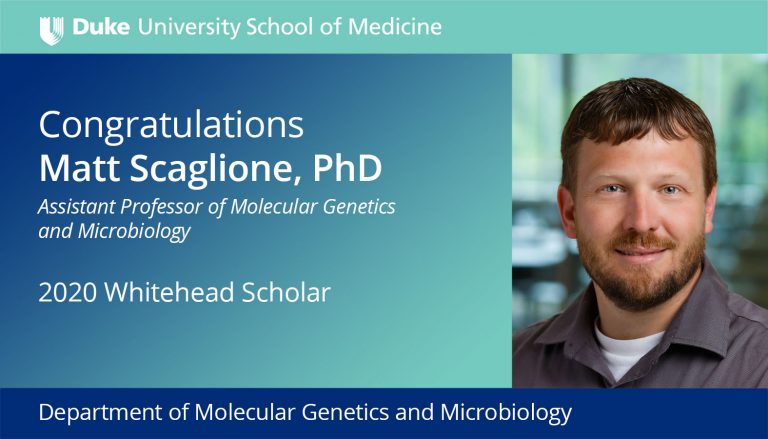
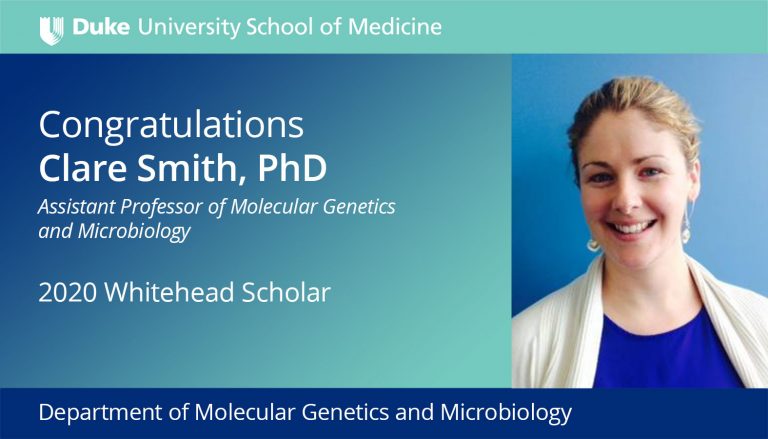
 Surana receives Hartwell Foundation Award. Congratulations to Neil Surana, M.D., Ph.D. Assistant Professor of Pediatrics and MGM’s secondary Faculty Member on receiving the Hartwell Individual Biomedical Research Award.
Surana receives Hartwell Foundation Award. Congratulations to Neil Surana, M.D., Ph.D. Assistant Professor of Pediatrics and MGM’s secondary Faculty Member on receiving the Hartwell Individual Biomedical Research Award.
The primary mission of The Hartwell Foundation is to grant awards to individuals for innovative and cutting-edge biomedical applied research that will potentially benefit children. The individuals and children should be citizens of the United States. The general aim is to provide funds for early stage research projects that have not yet qualified for funding from traditional sources. The Primary Mission of the Foundation is led by the President.
Surana’s research innovatively integrates gnotobiotic murine models, immunology, microbiology, and characterization of the microbiota with the ultimate aim of identifying specific commensal bacteria with immunomodulatory potential and subsequent characterization of their biologic effects. We have recently developed an inventive approach for identifying with high specificity organisms within the microbiota that are causally related to the phenotype of interest. Using this approach of microbe–phenotype triangulation, we identified Clostridium immunis, a new bacterial species that protects against colitis in murine models, and two bacterial species that induce host expression of a critical antimicrobial peptide. We are now investigating the molecular mechanisms—from both the bacterial and host perspectives—that underlie these host–commensal relationships. Furthermore, we are extending our discovery platform to human samples and additional disease processes to identify more causal microbes.
Surana joins MGM faculty Lawrence David, Nick Heaton and Debby Silver on receiving this spectacular award.
For additional information see http://www.thehartwellfoundation.org/
Please click here to see School of Medicine announcement about Dr. Surana receiving the Hartwell Foundation Award.
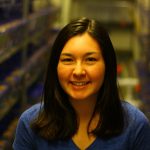 Cece Kelly awarded NIDDK F31. Cece Kelly, a PhD candidate in the Rawls lab, has just been awarded an NIDDK Ruth L. Kirschstein National Research Service Award Individual Predoctoral Fellowship (F31). The title of Cece’s proposal was “The role of HNF4a in maintaining intestinal epithelial cell homeostasis in the presence of microbes”. This award will support her research on microbiota-sensitive transcriptional programs that maintain intestinal homeostasis.
Cece Kelly awarded NIDDK F31. Cece Kelly, a PhD candidate in the Rawls lab, has just been awarded an NIDDK Ruth L. Kirschstein National Research Service Award Individual Predoctoral Fellowship (F31). The title of Cece’s proposal was “The role of HNF4a in maintaining intestinal epithelial cell homeostasis in the presence of microbes”. This award will support her research on microbiota-sensitive transcriptional programs that maintain intestinal homeostasis.
 Hoy receives perfect score on F31. Michael Hoy, MGM Graduate student in the Heitman Lab received a perfect score of 10 on his most recent F31 submission to NIAID. The title of Michael’s proposal was “Structure-guided development of fungal specific calcineurin inhibitors”. Calcineurin is a novel antifungal target that is required for immune activation in humans and essential for virulence in pathogenic fungi such as Cryptococcus neoformans, Candida albicans, and Aspergillus fumigatus. We proposed to design fungal-specific calcineurin inhibitors through rational, crystal structure-guided design, which then can be developed and implemented to treat fungal infections. These novel antifungal compounds will serve as a powerful addition to the currently limited armamentarium of antifungal drugs.
Hoy receives perfect score on F31. Michael Hoy, MGM Graduate student in the Heitman Lab received a perfect score of 10 on his most recent F31 submission to NIAID. The title of Michael’s proposal was “Structure-guided development of fungal specific calcineurin inhibitors”. Calcineurin is a novel antifungal target that is required for immune activation in humans and essential for virulence in pathogenic fungi such as Cryptococcus neoformans, Candida albicans, and Aspergillus fumigatus. We proposed to design fungal-specific calcineurin inhibitors through rational, crystal structure-guided design, which then can be developed and implemented to treat fungal infections. These novel antifungal compounds will serve as a powerful addition to the currently limited armamentarium of antifungal drugs.
Michael joins Shelby Priest, Hannah Brown, Stephen Walsh and Kyle Gibbs, MGM graduate students who also received perfect scores on F31 submissions.
 Gokhale selected for a Harold M. Weintraub Graduate Student Award. Congratulations to Nandan Gokhale, graduate student in Stacy Horner’s lab, on being selected for a Harold M. Weintraub Graduate Student Award to recognize outstanding achievement in Graduate Studies.
Gokhale selected for a Harold M. Weintraub Graduate Student Award. Congratulations to Nandan Gokhale, graduate student in Stacy Horner’s lab, on being selected for a Harold M. Weintraub Graduate Student Award to recognize outstanding achievement in Graduate Studies.
Nandan’s thesis work focuses on understanding RNA regulatory controls of viral infection. Specifically, he studies how the RNA modification N6-methyladenosine (m6A) on viral and host RNAs regulates infection by viruses in the Flaviviridae family. Nandan found that m6A on the hepatitis C virus RNA genome negatively regulates viral particle production by facilitating a competition between the viral capsid protein and cellular m6A “reader” proteins for viral RNA packaging into virions (Gokhale et al., 2016). This work described a new regulatory mechanism of viral infection, and reveals that m6A acts on viral RNAs to regulate distinct stages of their life cycles. Nandan has also identified infection-induced changes in the cellular m6A-epitranscriptome which indicate that m6A exerts transcript-specific effects to influence the fate of cellular mRNAs and ultimately affect viral infection (Gokhale, McIntyre et al., 2019). Together, these exciting findings are illuminating how m6A dynamically regulates the host response to RNA virus infection and why it matters.
Please click here to see Duke’s Press Release on Nandan geting the Weintaub award.
Others associated with MGM who have also received this award:
Audrey Odom John, PhD now director of Pediatric Infectious Diseases at Children’s Hospital in Philadelphia and Gianna Hammer, MGM secondary faculty member
To see more about this award click here.
 Walsh awarded NIH F31. Stephen Walsh, a PhD candidate in the Coers lab, has just been awarded an NIAID Ruth L. Kirschstein National Research Service Award Individual Predoctoral Fellowship (F31). This award will support his research on the sexually transmitted pathogen Chlamydia trachomatis and its interactions with the human innate immune system.
Walsh awarded NIH F31. Stephen Walsh, a PhD candidate in the Coers lab, has just been awarded an NIAID Ruth L. Kirschstein National Research Service Award Individual Predoctoral Fellowship (F31). This award will support his research on the sexually transmitted pathogen Chlamydia trachomatis and its interactions with the human innate immune system.


Smith and Scaglione selected to be a Whitehead Scholars for the next five years. Clare Smith and Matt Scaglione, Assistant Professors in MGM, have been selected to be a Whitehead Scholars for the next five years. The Whitehead family established a fund at Duke to support new assistant professors and their research.
The Smith Lab will pursue the mechanisms b which genetic variation in the host alters the immune pressures experienced by pathogens, such as Mycobacterium tuberculosis. By understanding how these interactions drive specific arms of immunity, new host-pathogen paired vaccines and therapeutics can be rationally designed.
The Scaglione Lab research focus “Proteopathies are a class of at least 71 diseases characterized by the accumulation of protein aggregates. Protein aggregates are caused by an imbalance in protein homeostasis resulting in the accumulation of misfolded proteins. One major question in biomedical research is: How do cells recognize and deal with misfolded proteins? To investigate this laboratories utilize a wide array of model organisms to interrogate cellular pathways that handle misfolded proteins. Research in our lab focuses on utilizing the model organism Dictyostelium discoideum to investigate cellular responses to neurotoxic proteins. We have chosen to utilize Dictyostelium as a model organism because we realized that Dictyostelium normally expresses proteins with long polyglutamine tracts that cause one class of proteopathy. Our lab and others have shown that Dictyostelium have an extraordinary ability to resist aggregation of a polyglutamine expanded protein know to aggregate in other model organisms. Our lab went on to identify a novel type of molecular chaperone that imparts Dictyostelium resistance to polyglutamine aggregation. In the future we hope to leverage our findings in Dictyostelium to develop novel therapies to treat neurodegenerative diseases”.
Lawrence David, Assistant Professor in MGM, was presented with an unusual project by his advisor when he was a student: to study he own feces for a full year. By accepting this challenge, Lawrence went on a journey of scientific and personal discovery, see below:
 Lickwar receives School of Medicine Research Staff Appreciation Award. Dr. Colin Lickwar, a Research Scientist in the laboratory of Dr. John Rawls, has received the School of Medicine Research Staff Appreciation Award. Sponsored by the Dean and Research Vice Deans, this award recognizes recognize staff members who provide exemplary support in the conduct of research. Applying his expertise in genome science and bioinformatics, Colin conducts primary research into the transcriptional mechanisms underlying host-microbe symbiosis and other aspects of intestinal physiology. His recent paper in PLoS Biology revealed a transcriptional regulatory network in intestinal epithelial cells that has been conserved over the last 420 million years of vertebrate evolution. He also contributes significantly to lab management, to mentoring of trainees, and to supporting many other research projects and collaborations in the Rawls lab.
Lickwar receives School of Medicine Research Staff Appreciation Award. Dr. Colin Lickwar, a Research Scientist in the laboratory of Dr. John Rawls, has received the School of Medicine Research Staff Appreciation Award. Sponsored by the Dean and Research Vice Deans, this award recognizes recognize staff members who provide exemplary support in the conduct of research. Applying his expertise in genome science and bioinformatics, Colin conducts primary research into the transcriptional mechanisms underlying host-microbe symbiosis and other aspects of intestinal physiology. His recent paper in PLoS Biology revealed a transcriptional regulatory network in intestinal epithelial cells that has been conserved over the last 420 million years of vertebrate evolution. He also contributes significantly to lab management, to mentoring of trainees, and to supporting many other research projects and collaborations in the Rawls lab.